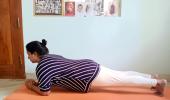Fibromyalgia is a chronic condition that is typically characterised by widespread tenderness and pain throughout the body.
It is usually accompanied by fatigue, sleep and mood disturbance, says rediffGURU Nidhi Gupta, founder of Merahki Holistic Wellness.
- You can post your questions to rediffGURU Nidhi Gupta HERE.

'Ooh... Aah... Ouch!!'
If this is what you have been feeling often in the day for a long time now and there has been no significant cause or diagnosis given to you yet, then chances are you are a victim of fibromyagia.
What is fibromyalgia?
Fibromyalgia is a chronic condition that is typically characterised by widespread tenderness and pain throughout the body. It is usually also accompanied by fatigue, sleep and mood disturbance.
Researchers believe that fibromyalgia amplifies the way your brain and spinal cord process painful and non-painful signals.
Fibromyalgia facts
- It usually affects women more than men.
- Middle aged people (30 to 50 years) are at more risk.
- There is no test to determine fibromyalgia. However doctors may ask for some tests like X-rays/blood tests to rule out conditions resembling fibromyalgia.
- There is no known cause yet for fibromyalgia. However any kind of physical or emotional trauma, genetics, mood or sleep disorders may be contributing factors.
Symptoms of fibromyalgia
- Widespread pain.
- Muscle stiffness and joint pains on waking up.
- Tingling and numbness in hands and feet.
- Headaches.
- Restless leg syndrome.
- Hypersensitivity to heat or cold.
- Irregular sleep pattern.
- Digestive issues.
- Difficulty in concentrating, memory and brain fog feeling known as 'fibro fog'.
- Mood swings and irritability for no reason.
- Nausea.
- Vision difficulties.
- Breathing issues.
- Rapid weight gain.
- Skin problems
Can fibromyalgia be treated?
There is no definitive treatment yet for fibromyalgia.
However, in my 15 years of experience identifying cases of fibromyalgia, I have noticed that alternative treatments can make a huge impact to reduce pain and improve their quality of life.
There are certain medicines that can help to reduce the symptoms which your general physician or doctor can help you with.
Below are some of the alternative therapies that can help you tremendously:
1. Physiotherapy
Techniques like dry needling, myofascial release, cupping can help to release the muscle tension, thereby reducing pain.
Stretches can reduce overall stiffness.
Certain strengthening exercises for core muscles can help.
2. Aqua therapy
Walking in water for 15 to 20 minutes three to four times a week or doing some light aerobic exercises in water can help reduce the muscle pain and joint stiffness.
Water can play a very soothing effect in treating fibromyalgia.
It's a good form of exercise since the person feels much lighter in water and the impact is also low on the joints.
3. Acupuncture
This works on certain energy meridians and can help in releasing the blocks and enhance the flow of energy in the body. Many people find relief with this technique.
4. Yoga and breathwork
Gentle yoga which does not put impact on joints is beneficial done under supervision.
Certain breathing techniques like alternate nostril breathing, box breathing and kumbhak therapy can play a significant role in reducing anxiety, improving oxygenation, enhancing sleep quality, improving flexibility and alleviating pain.
5. Diet
This is probably one of the most important aspects in fibromyalgia.
It is advisable to go to a good nutritionist who can customise your nutrition plan.
It is commonly seen that avoiding sugar, gluten and dairy can reduce the pain.
6. Ayurveda
A vata-pacifying diet, including warm and nourishing foods, is usually recommended.
This may involve incorporating well-cooked grains, cooked vegetables and warming spices like ginger and turmeric into daily meals. Avoiding cold, raw or processed foods is emphasised to maintain a digestive balance.
Certain herbs like ashwagandha, turmeric, guggulu and shalaki may help.
Gentle warm oil massages and Ayurvedic treatments like shirodhara are found to be extremely relaxing and beneficial.
7. Mindfulness and meditation
Certain mindfulness techniques can help calm thoughts and emotions so that one can have a more positive mindset and cope better.
Meditation can significantly help as well.
Communication, investing time with loved ones, pursuing a hobby -- all these can help the person feel more joyful, accepted, loved and hence heal.
Letting go of past hurt and forgiving others and situations can help.
- You can post your questions to rediffGURU Nidhi Gupta HERE.
Disclaimer: All content and media herein is written and published online for informational purposes only. It is not a substitute for professional medical advice. It should not be relied on as your only source for advice.
Please always seek the guidance of your doctor or a qualified health professional with any questions you may have regarding your health or a medical condition. Do not ever disregard the advice of a medical professional, or delay in seeking it because of something you have read herein.
If you believe you may have a medical or mental health emergency, please call your doctor, go to the nearest hospital, or call emergency services or emergency helplines immediately. If you choose to rely on any information provided herein, you do so solely at your own risk.
Opinions expressed herein cannot necessarily provide advice to fit the exact specifics of the issues of the person requesting advice.











